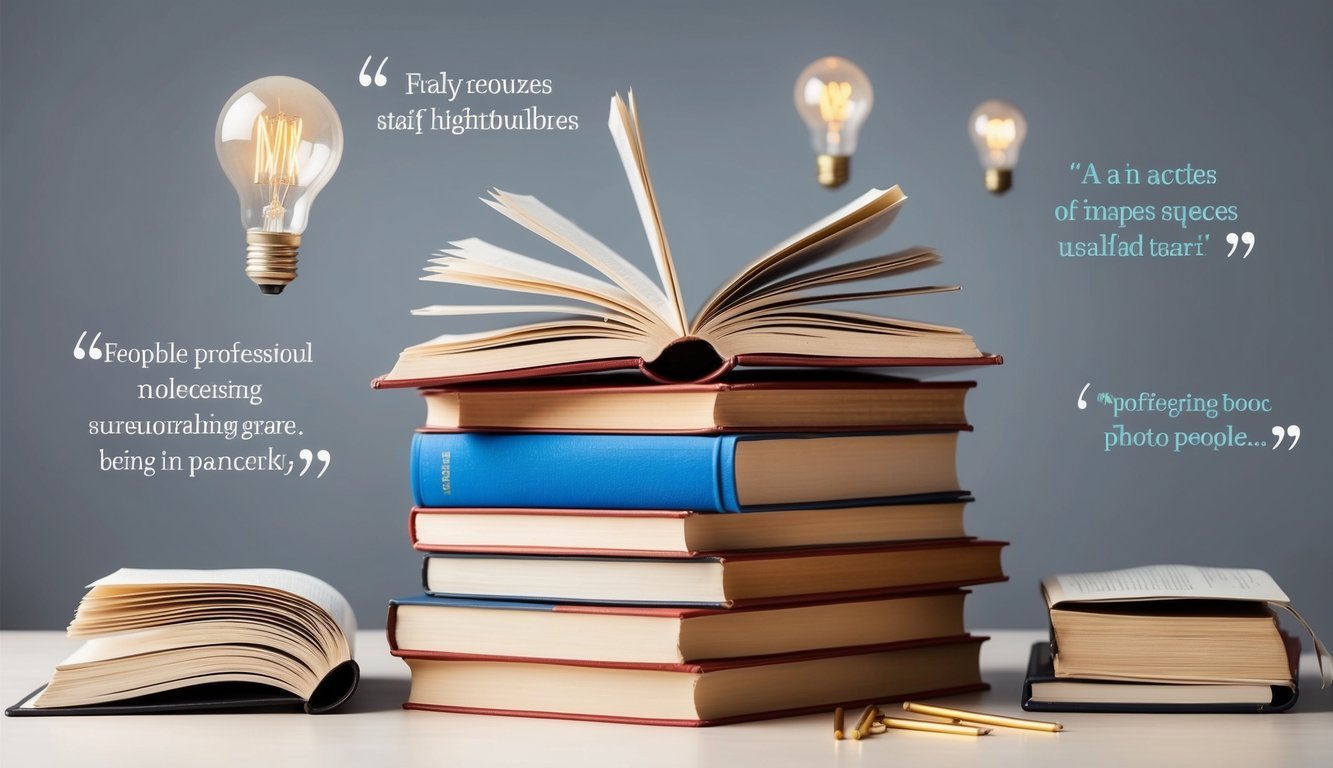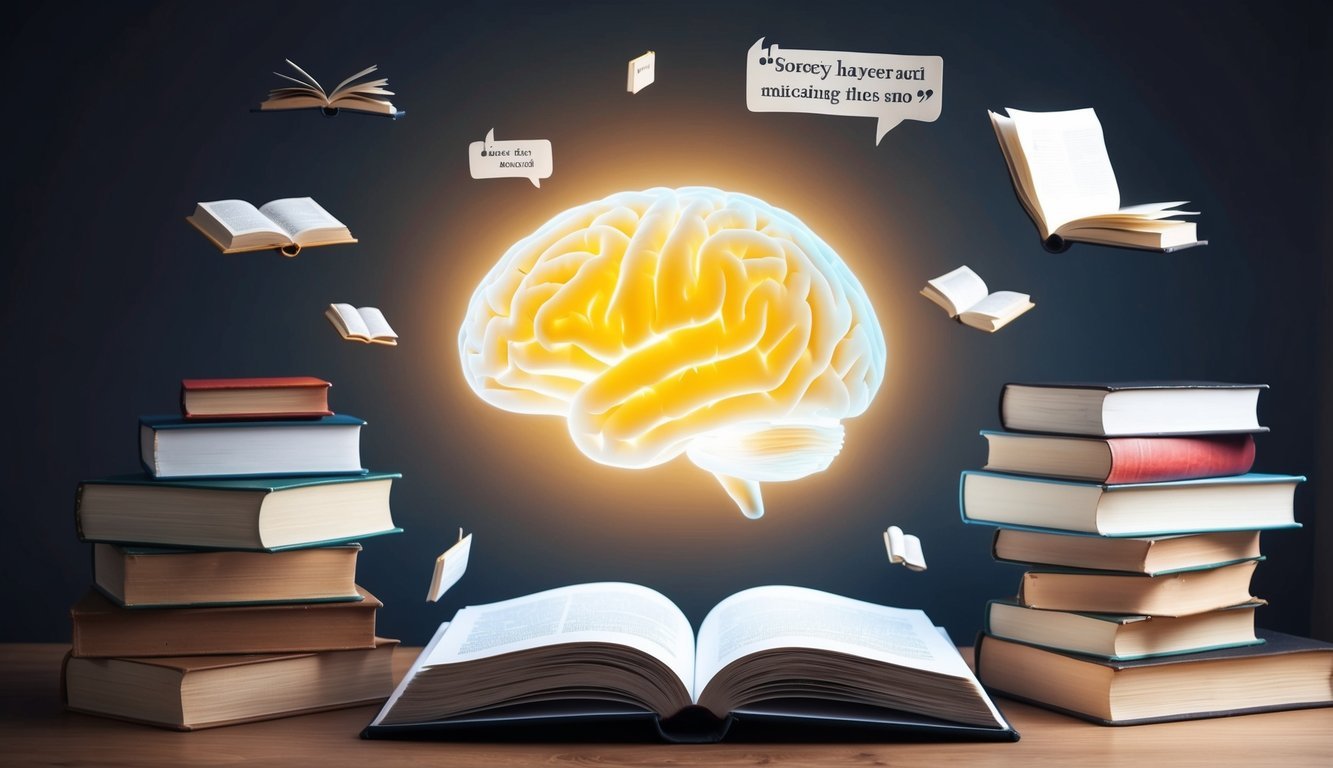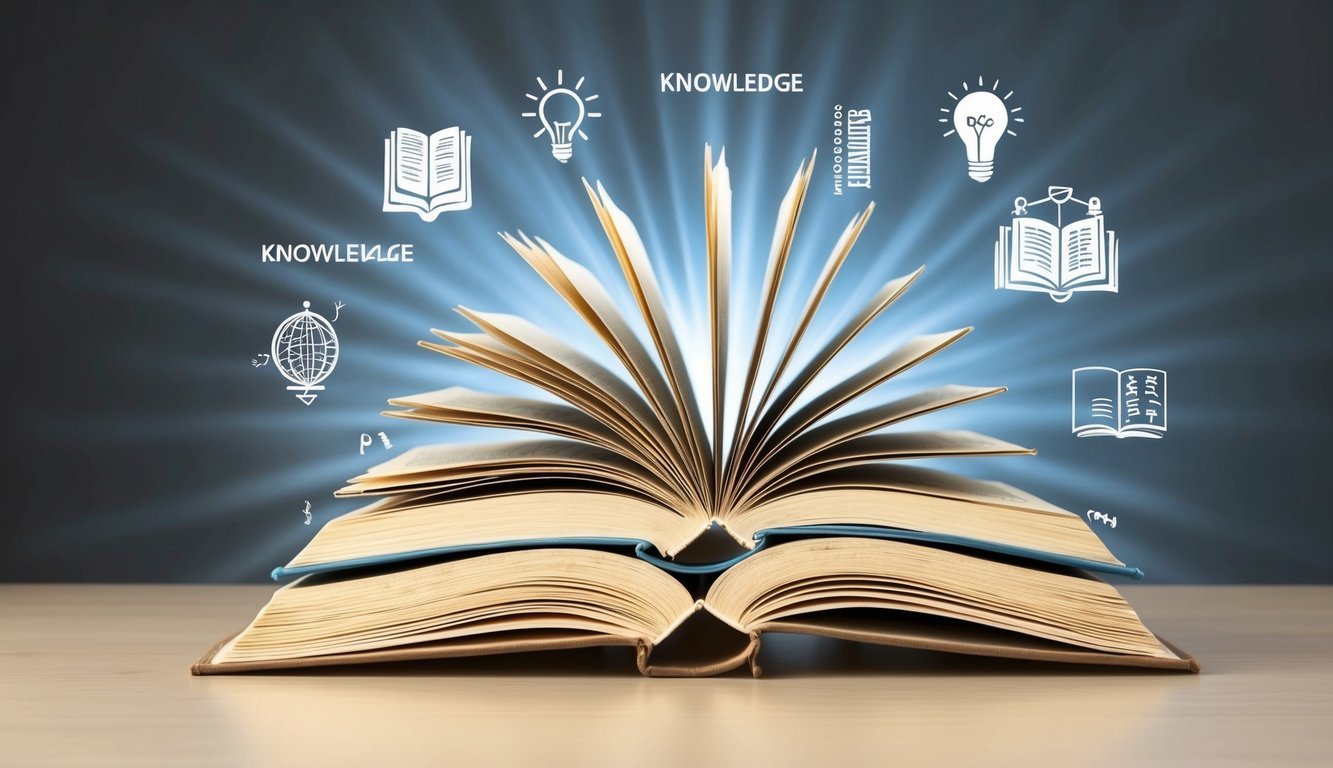Physical Address
304 North Cardinal St.
Dorchester Center, MA 02124
Physical Address
304 North Cardinal St.
Dorchester Center, MA 02124
Quotes emphasize the transformative power of knowledge, illustrating its role in personal growth, decision-making, curiosity, and the importance of lifelong learning in achieving success.

Quotes can be a powerful tool for inspiration and motivation.
They often capture wisdom in just a few words and can offer new perspectives on life. These 22 knowledge quotes aim to expand the mind and encourage readers to think differently about the world around them.
Exploring different viewpoints through quotes can lead to personal growth and a deeper understanding of various subjects.
Each quote holds the potential to challenge existing beliefs and spark curiosity.
Readers can find encouragement and insight that may resonate with their own experiences.

Benjamin Franklin believed that gaining knowledge is one of the best investments a person can make.
Are you tired of spinning your wheels and getting nowhere? Simply put, you’re out of sync: you’re out of alignment with your astral configuration.
But: there’s a kind of map that can help you reclaim your alignment. Think of it as your own personal blueprint to success and happiness: a blueprint that will help you live your most amazing life.
Get started here.
He thought that education and learning could lead to greater success in life.
When someone learns something new, it opens doors to better opportunities.
Knowledge can help with personal growth and decision-making.
Franklin encouraged people to seek wisdom throughout their lives.
By pursuing education, they can build a strong foundation for their future.
He understood that the benefits of learning last a lifetime.
Franklin’s quote reminds everyone to value education.
It suggests that spending time and effort on learning will yield valuable returns in the end.

Leonardo da Vinci believed in the endless power of learning.
He thought that the more knowledge a person gains, the more their mind grows.
This quote highlights the idea that learning can be fulfilling and energizing.
It encourages people to pursue knowledge without fear of fatigue.
Da Vinci was a true example of a lifelong learner.
He explored a variety of subjects, from art to science, showing that curiosity has no limits.
His perspective suggests that every new fact or skill adds to one’s understanding.
This belief can inspire anyone to keep seeking knowledge throughout their lives.
Learning can be both enjoyable and beneficial.
With each new piece of information, one’s mind becomes sharper and more open.
Embracing this idea can lead to personal growth and a richer life.

Alexander Pope famously said, “A little knowledge is a dangerous thing.” This quote warns against the risks of knowing just a bit about a subject.
When a person learns only a little, they may feel confident.
This confidence can lead them to make mistakes or poor decisions.
It shows that having only a small amount of information can sometimes be more harmful than helpful.
This idea can apply to many areas in life.
For instance, in science or technology, limited knowledge can lead to misunderstandings.
Pope’s saying reminds people to keep learning and seek deeper understanding.
Knowledge should be broad and well-rounded to be truly helpful.
Balancing what one knows helps in making better choices.

Samuel Butler encourages everyone to maintain a sense of curiosity.
Curiosity leads to learning and personal growth.
When a person stays curious, they are more likely to seek knowledge.
This quote reminds individuals that knowledge doesn’t just come to them.
They must actively pursue it.
By asking questions and exploring new topics, they can expand their understanding.
Being curious can also spark creativity.
It opens the mind to new ideas and perspectives.
This approach can lead to unexpected discoveries in various fields.
Curiosity is essential in both personal and professional life.
It helps to uncover new interests and skills.
Cultivating curiosity can make everyday experiences more enriching.
In a world full of information, those who remain curious will find opportunities for growth.
This mindset builds a lifelong love for learning.

This quote emphasizes the power of self-talk.
What a person tells themselves can shape their beliefs and feelings.
Positive thoughts can lead to a more optimistic outlook on life.
When someone fills their mind with faith, love, and hope, they cultivate a healthier mental state.
This can boost confidence and motivation.
Negative self-talk, on the other hand, can create doubts and fears.
People can use this understanding to their advantage.
By choosing words that inspire and uplift, they can change their mindset.
For instance, telling oneself “I can do this” can foster a sense of capability and strength.
It’s important for everyone to pay attention to their inner dialogue.
Encouraging thoughts can lead to personal growth and a better life.
Simple reminders of one’s strengths and values can be very effective.

Seeking knowledge is like traveling to new places.
Each piece of information opens up new paths.
When someone learns something new, they start to see the world differently.
Ideas that seemed out of reach now feel possible.
This journey can change how a person thinks and acts.
It can spark creativity and inspire action.
In this way, knowledge helps break down barriers.
Understanding different viewpoints can lead to new solutions.
People who pursue knowledge often find they can achieve more than they thought.
They grow in their abilities and confidence.
The journey may not always be easy, but it is rewarding.
Each step taken into the world of learning expands their potential.

This quote highlights the close relationship between knowledge and personal development.
Knowing facts can be interesting, but understanding them leads to deeper insights.
When someone truly understands a topic, they can think critically about it.
This ability to analyze helps a person grow in both knowledge and skills.
Growth also happens when people apply what they learn.
Using knowledge in real-life situations helps to reinforce understanding.
Learning is a continuous journey.
As individuals gain more knowledge, they open doors to new ideas and opportunities.
With each new understanding, a person becomes more informed.
This can lead to better decision-making and problem-solving abilities.
Ultimately, to grow means to evolve.
Knowledge and understanding play key roles in this evolution, shaping how they see the world.

This quote highlights the connection between thoughts and actions.
It suggests that what a person thinks can directly impact how they communicate.
Positive thoughts often lead to kind words.
Words can influence actions too.
When someone speaks positively, they are more likely to act positively.
This creates a cycle where good thoughts encourage good behaviors.
The quote reminds individuals to be mindful of their thinking.
If they focus on positive thoughts, their words and actions will reflect this mindset.
It’s a simple way to encourage personal growth and healthier relationships.
By paying attention to thoughts, people can create a more positive environment for themselves and others.
This awareness can lead to stronger communication and better outcomes in daily life.

Earl Nightingale shared a powerful idea about the subconscious mind.
He believed that what a person focuses on and feels deeply about can shape their reality.
When someone plants positive thoughts in their mind, those thoughts can grow.
Repetition and strong emotions help to reinforce these ideas.
For example, if a person consistently thinks about their goals, they are more likely to achieve them.
The emotions tied to these thoughts make them stronger.
Nightingale’s quote encourages people to be mindful of their thinking.
By nurturing positive beliefs, they can create positive changes in their lives.
It’s a reminder that thoughts have power.

Education is a lifelong journey.
It doesn’t stop after a certain age or at the end of school.
Learning happens every day, in big and small ways.
People can learn from experiences, conversations, and even mistakes.
Each moment is an opportunity to grow and gain new knowledge.
Curiosity is key.
When someone stays curious, they find new interests and ideas.
This can lead to unexpected discoveries.
Education also includes learning about different cultures and perspectives.
This helps people understand the world better and connect with others.
By embracing education, individuals can adapt to changes and challenges.
They become more open-minded and innovative.
Whether through reading, traveling, or talking with others, every experience counts.
The journey of learning continues as long as a person is willing to explore and ask questions.

Learning never truly stops.
From childhood through adulthood, education continues in different forms.
This idea encourages people to stay curious and open to new experiences.
They can learn from various situations, whether in school, at work, or through personal relationships.
Each experience teaches something valuable.
Embracing lifelong learning helps individuals grow and adapt.
It builds confidence and can lead to new opportunities.
This process can also nurture creativity and problem-solving skills.
With each lesson learned, individuals expand their minds and understand the world better.
By recognizing that learning is ongoing, they can find joy in discovery and knowledge.
This perspective makes life richer and more fulfilling.

This quote by Winston Churchill highlights an important point about learning.
It shows that being open to new ideas is essential, even if the way they are presented can be challenging.
Many people relate to this feeling.
They often enjoy discovering new concepts but may not appreciate how they are taught.
Learning can sometimes be frustrating, especially when methods do not match personal preferences.
This quote encourages individuals to embrace learning, even when the process feels uncomfortable.
It suggests that a willingness to learn is more important than the enjoyment of being taught.
By focusing on personal growth, they can find value in experiences that might seem tough at first.
Staying open-minded can lead to better understanding and deeper knowledge over time.

This quote emphasizes the importance of sharing what you learn.
When someone shares knowledge, it becomes more useful.
It grows when others add their own ideas and understandings.
Sharing information helps everyone involved.
It creates a learning community where ideas can flourish.
Each time knowledge is shared, it gains new perspectives and insights.
People become better thinkers by discussing and exchanging information.
They build on each other’s strengths.
This teamwork fosters a deeper understanding of topics.
Knowledge sharing also encourages collaboration.
It helps break down barriers and connects people.
When individuals share, they open doors to new relationships and innovations.

This quote emphasizes the power of thoughts in shaping outcomes.
It suggests that both success and failure start in the mind.
Positive thoughts can lead to proactive actions, while negative thoughts can hold someone back.
When a person believes in their abilities, they are more likely to take risks and pursue goals.
This mindset can create opportunities and foster success.
Conversely, doubt can lead to inaction and missed chances.
The message encourages individuals to focus on their thought patterns.
By cultivating a positive attitude, they can influence their actions and results.
This can be a powerful way to improve one’s life and achieve personal goals.
This quote by B.B. King highlights the lasting power of education.
Learning equips individuals with knowledge and skills that are personal and enduring.
No matter where life leads, the lessons learned stay with a person forever.
From school subjects to life experiences, every bit of knowledge adds to who they are.
Education is unique because it cannot be stripped away.
Unlike material possessions, what someone learns becomes a part of their identity.
This idea encourages people to embrace learning throughout their lives.
It reminds them that every moment spent gaining knowledge is valuable.
B.B. King’s words inspire everyone to seek out new ideas and experiences.
By doing so, they become richer in thought and understanding.
Learning truly is a gift that keeps on giving.
Nelson Mandela believed in the importance of education.
He saw it as a tool that can create positive change.
Education allows people to grow, think critically, and improve their lives.
When individuals are educated, they can better understand their rights and responsibilities.
Knowledge empowers them to make informed decisions.
This in turn can benefit their communities.
Mandela’s quote reminds everyone that education can break cycles of poverty and injustice.
It opens up opportunities for a brighter future.
Through learning, people can achieve their dreams and help others do the same.
His message inspires educators and students alike.
It highlights the impact of teaching and learning.
Education is not just a path to personal success, but also a way to uplift society.
This quote by Benjamin Franklin highlights the importance of education and learning.
When a person invests time and resources in gaining knowledge, the benefits can be lifelong.
Knowledge helps individuals make better decisions and solve problems effectively.
It opens doors to new opportunities and fosters personal growth.
Increased knowledge can also lead to better job prospects and career advancements.
Companies often seek individuals who are well-educated and skilled in their fields.
Furthermore, learning can enrich a person’s life by broadening their perspectives.
It enables them to understand the world better and connect with others.
This quote by Anthony J. D’Angelo encourages a love for learning.
When one has a passion for education, growth becomes a natural part of life.
Learning is not just about facts and figures.
It is about curiosity and the desire to understand the world better.
This mindset helps people adapt to changes and challenges they face.
A strong passion for learning can lead to new experiences.
It opens doors to different ideas and paths that one might not have considered before.
Moreover, pursuing knowledge can inspire others.
When someone shares their love for learning, it motivates friends and family to explore and grow alongside them.
The phrase “Knowledge is power” is credited to Sir Francis Bacon.
He was an English philosopher and statesman in the late 1500s and early 1600s.
His work emphasized the importance of knowledge in driving progress and understanding the world.
Bacon believed that knowledge could empower individuals and societies.
It enables people to make informed decisions and solve problems.
With knowledge, one can gain confidence and clarity in various situations.
This simple quote reminds us that learning is essential.
It encourages curiosity and exploration.
Knowledge helps people grow and adapt over time.
When individuals seek knowledge, they open doors to new possibilities.
This can lead to personal growth and improved communication in society.
Bacon’s idea remains influential today, inspiring many to value education and wisdom in their lives.
Socrates, a great philosopher from ancient Greece, shared many ideas that still matter today.
One of his most famous quotes is, “The only true wisdom is in knowing you know nothing.” This thought encourages humility and awareness.
When he said this, Socrates meant that understanding one’s own limits is important.
It’s easy to assume that we know many things.
By recognizing what we don’t know, people can open their minds to new ideas.
This quote reminds everyone that learning is a lifelong journey.
No matter how much knowledge someone gains, there is always more to learn.
Embracing this mindset can lead to personal growth and deeper understanding.
Socrates often asked questions to prompt thinking.
He believed that questioning helps uncover truths.
So, taking the time to ask questions can lead to greater insight.
Understanding that there is always more to learn can lead to true wisdom in life.
This quote highlights the value of wisdom and knowledge.
It suggests that true strength comes not just from physical ability but from understanding and insight.
A wise person uses their knowledge to make better choices.
They can navigate difficult situations and support others around them.
Their wisdom allows them to influence and lead effectively.
Knowledge doesn’t just empower individuals; it also broadens their potential.
With every new piece of information, a person’s capability grows.
This growth can lead to greater achievements and success.
In life, embracing learning and knowledge fosters strength.
The more someone understands, the more they can contribute to their community.
This quote reminds everyone that wisdom is a profound source of strength.
John Dewey was an important thinker in education.
He believed that learning is a key part of everyday life.
Education is not just a step before working or living fully.
Dewey’s quote stresses that learning happens all the time.
It is not limited to classrooms or formal lessons.
People gain knowledge through experiences and interactions.
By viewing education this way, Dewey encourages an active approach to life.
Each moment offers a chance to learn something new.
This mindset can help individuals grow in many areas.
Embracing education as a life-long journey can open doors.
It helps people become more curious and engaged with the world.
This quote reminds everyone of the joy and importance of continuous learning.
Knowledge plays a crucial role in personal development.
A popular saying is, “Your mind will always believe everything you tell it.” This highlights the impact of self-talk and how knowledge shapes beliefs and growth.